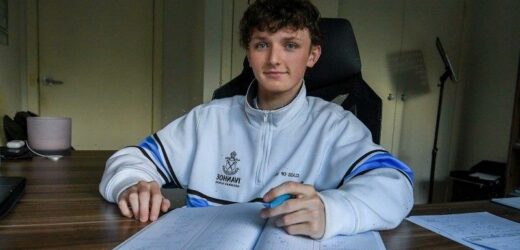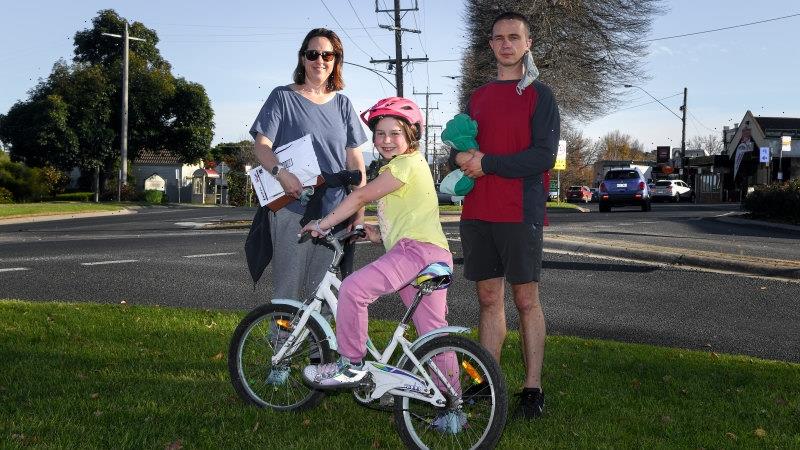For our free coronavirus pandemic coverage, learn more here.
Frank Bevacqua spent his first four years of high school telling himself that year 12 was going to be the year he would leave nothing in the tank, only to find his tank drained by months of lockdown in year 11.
“I always thought going through years 7, 8, 9, 10, [year 12 is] the year that is everything – the year I’ll really, really need to try,” the Ivanhoe Grammar student said on Wednesday.
“I found my really trying year was year 11, and now that I’m in year 12, I’m like, how do I step up from what year 11 was? How do I give more?”
Year 12 student Frank Bevacqua, is happy to be returning to the classroom on Friday.Credit:Joe Armao
So he was rapt to hear on Wednesday that he would be back at the place where he works best by Friday, as the state government said VCE and VCAL students in greater Melbourne, and all students in regional Victoria, would return to the classroom.
“I was so happy and all my friends were as well,” he said. “We all messaged each other: let’s go, we’re back, let’s see our important people again.”
However, the first VCE exam of 2021 has been postponed amid the extension of Victoria’s snap lockdown.
The General Achievement Test was scheduled for June 9 but has been pushed back because of the lockdown for the second year in a row. The Victorian Curriculum and Assessment Authority told schools the test would take place in coming weeks.
The deadline for several school-based VCE assessments due next week has also been put back two weeks.
On Wednesday, the Andrews government said remote learning would continue for another week for students between prep and year 10 in all metropolitan Melbourne schools.
Chief Health Officer Brett Sutton said Victoria was “not at a point where we can confidently open schools across the board in metropolitan Melbourne”.
The authors of a report that found COVID-19 infections in Victorian schools were mainly driven by community transmission criticised the Andrews government last week for a blanket return to remote learning, arguing it was disproportionate and risked doing long-term emotional harm.
But Professor Sutton said the while the report was important, the virus had changed.
“Singapore has closed schools because they’re dealing with a variant … that has affected children more significantly, more severe illness, and more transmissible with children,” he said.
“We know these are tough times to go through for kids missing out on their mates and missing out on that face-to-face learning, which would always be our preference, but we don’t want to be in a situation where we’ve got significant outbreaks in schools or transmission in the community and need to make a choice about a longer period of lockdown.”
Report co-author Professor Fiona Russell, of the Murdoch Children’s Research Institute, said the announcement of a return for senior and regional students was welcome, but said: “Preps to year 10 also need to get back to school as soon as possible, and we encourage the development of a plan to enable this to happen safely.”
Addressing calls for educators to have priority access to COVID-19 vaccines, Professor Sutton said the vaccine priority list was a Commonwealth decision.
“Teachers who are already eligible by virtue of age, I’d encourage them to come forward and walk in where they can,” he said.
Professor Sutton said the statewide return of senior students was designed to stop them falling behind during a critical period of their education and was a manageable risk.
They will be required to wear masks except when eating and drinking, and will be encouraged to travel alone to and from school, not with other students or families.
Susan Ryan, principal of Lisieux Catholic Primary School in Torquay, said she was delighted to see the return of students planned for Friday.
“There is nothing that replaces the collaborative learning practice that can best take place in a learning community,” she said.
Ballarat Grammar year 12 student Frankie was pleased to learn VCE and all regional students would return to the classroom.
She said students were experiencing a mental health crisis after two stints of remote learning this year and long months of remote learning in 2020.
“That’s the main thing we learnt from last year,” she said. “It needs to be addressed and worked on by schools and the education system.”
Stay across the most crucial developments related to the pandemic with the Coronavirus Update. Sign up to receive the weekly newsletter.
Most Viewed in National
From our partners
Source: Read Full Article



